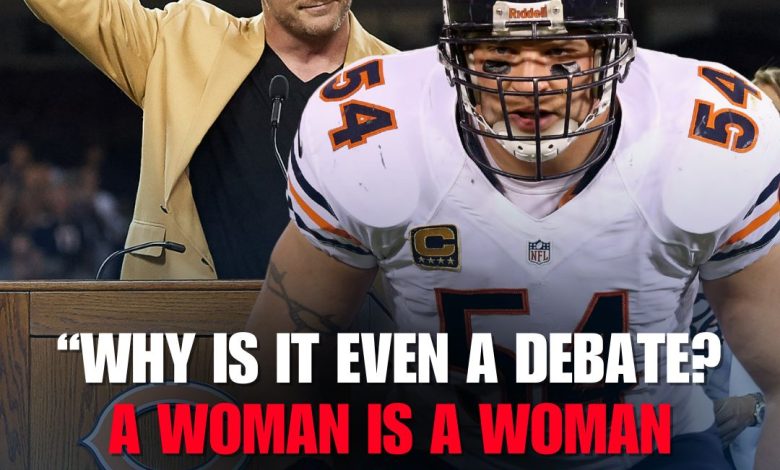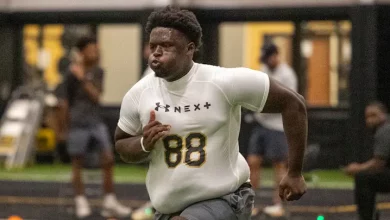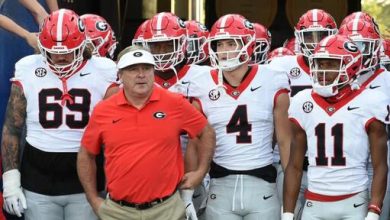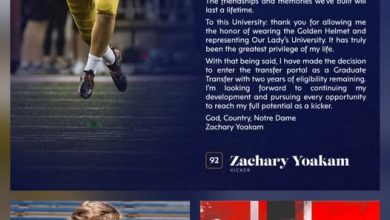Brian Urlacher Takes Stand in Transgender Athlete Debate, Praises Trump’s Executive Order Protecting Girls’ Sports Amid Illinois Controversy

In the world of professional sports, athletes often find themselves pushed into the spotlight on a range of issues beyond their athletic prowess. For Chicago Bears legend Brian Urlacher, this spotlight is shining brightly on a controversial and polarizing topic: the participation of transgender athletes in women’s sports. The former Pro Football Hall of Fame linebacker, renowned for his leadership on the football field, has recently made it clear where he stands in the ongoing debate, particularly as the issue has taken center stage in his home state of Illinois.
In the wake of a heated school board meeting that went viral, the conversation around transgender athletes in women’s sports has become a hot-button issue in Illinois, drawing strong opinions from various sides. Urlacher, known for his outspoken views and no-nonsense approach, has used his platform to voice his opinion on the matter, offering his support for former President Donald Trump’s executive order aimed at protecting girls’ sports from what he considers to be unfair competition.
In a world where the intersection of sports and politics often sparks intense debates, Brian Urlacher’s comments have added fuel to an already fiery conversation. This article will explore Urlacher’s position on the issue, his support for Trump’s executive order, and the broader implications of this controversial debate as it continues to play out in schools and communities across the United States.
The Transgender Athlete Debate: A National Conversation
The issue of transgender athletes competing in women’s sports has garnered significant attention in recent years, especially as more states and schools have been faced with the challenge of defining fair competition in sports. The debate revolves around whether transgender women (those who were assigned male at birth but identify as female) should be allowed to compete in women’s sports. Proponents argue that transgender athletes should be given the same opportunities to participate in sports and express their gender identity, while opponents believe that transgender women have physical advantages due to male puberty, such as greater muscle mass and bone density, that could undermine fairness in women’s competitions.
The issue has taken on greater urgency with high-profile cases, including transgender athletes dominating in female sports categories and sparking outrage among those who feel that fairness is being compromised. One of the key areas of concern for critics is the potential competitive edge that transgender women may have, particularly in strength-based or endurance sports like track and field, swimming, and contact sports. This has led to calls for more regulation or even a ban on transgender women competing in women’s sports, creating a divide that has not only polarized athletes but also lawmakers, educators, and sports officials.
In Illinois, this debate reached a boiling point when a local school board meeting discussing the inclusion of transgender athletes in girls’ sports went viral. The heated arguments between parents, teachers, and school officials sparked widespread attention, both for the contentious nature of the discussion and for the way in which it represented the growing divide in the broader debate. Amid this controversy, Brian Urlacher entered the conversation, using his voice as a high-profile public figure to offer his perspective.
Brian Urlacher’s Position on the Issue
Brian Urlacher, who spent his entire NFL career with the Chicago Bears, is no stranger to being in the public eye. Throughout his football career, Urlacher built a reputation not just as one of the most dominant linebackers in the NFL but also as a man of strong opinions. As a media personality and advocate for several causes, Urlacher has never been one to shy away from speaking his mind, especially on matters he believes to be important.
When it comes to the issue of transgender athletes competing in women’s sports, Urlacher’s stance is clear: he believes that transgender women should not be allowed to compete against biological females. He has expressed his support for former President Trump’s executive order, which sought to protect women’s sports by preventing transgender women from competing in women’s athletic categories. Urlacher referred to Trump’s executive order as “a common-sense thing,” emphasizing that the preservation of fairness in women’s sports is a priority.
“I just don’t think it’s fair for a biological male to compete against women,” Urlacher stated in a recent interview. “Sports should be about fairness and competition, and when you have someone with an unfair advantage, it doesn’t make the competition as legitimate. I think we need to protect girls’ sports, and that’s what this executive order does.”
Urlacher’s comments, while certainly reflective of his personal views, resonate with a larger faction of the population that is concerned with the fairness of competition in women’s sports. Supporters of Urlacher’s stance argue that the physical differences between males and females — particularly in terms of muscle mass, speed, and endurance — create an uneven playing field when transgender women are allowed to compete. They argue that this undermines the goals of Title IX, which was designed to ensure equal opportunities for female athletes.
In his support for Trump’s executive order, Urlacher is calling for regulations that would ensure biological women can continue to compete on a level playing field. Trump’s order, issued in 2020, directed the Department of Education to enforce policies that would prevent schools from allowing transgender women to participate in women’s sports unless certain criteria — such as hormone levels — were met. The executive order also sought to ensure that scholarships, grants, and other educational opportunities remain available to women athletes without the risk of being overshadowed by transgender women.
The Virality of the School Board Meeting
The national debate on transgender athletes reached a fever pitch after a school board meeting in Illinois went viral. The meeting, which was held at a suburban school district, focused on the district’s policies regarding transgender student-athletes. During the meeting, tensions ran high as parents, teachers, and school officials passionately argued both for and against the inclusion of transgender athletes in girls’ sports.
The meeting was marked by a series of emotional statements, with parents and advocates for transgender rights expressing concern about discrimination and exclusion, while those opposed to the idea voiced their belief that it would undermine fairness in girls’ sports. The debate quickly became a focal point for the media, drawing attention not just in Illinois but across the country.
As the meeting gained national attention, a number of high-profile figures, including Brian Urlacher, took to social media to voice their opinions. Urlacher, who has consistently used his platform to address social issues, expressed his belief that allowing transgender athletes to compete in women’s sports would be detrimental to the progress that has been made in women’s athletics. His comments sparked widespread debate on social media, with some applauding his stance, while others accused him of perpetuating discrimination and exclusion.
The viral nature of the school board meeting only served to amplify the conversation around transgender athletes, bringing it into the mainstream once again. As more people weighed in on the issue, the debate grew more heated, with each side presenting compelling arguments about the future of women’s sports and the rights of transgender athletes.
The Broader Implications: A Divided Nation
The debate over transgender athletes in women’s sports is not just about fairness in competition — it is also about the broader societal issues surrounding gender identity, inclusion, and rights. Supporters of transgender inclusion argue that athletes should be allowed to participate in sports consistent with their gender identity, and that denying them this right constitutes discrimination. They point to the need for greater inclusivity in all aspects of society, including sports, as a way of promoting equality and protecting the rights of marginalized groups.
On the other hand, critics, like Urlacher, contend that fairness and safety in women’s sports must be prioritized. They argue that allowing athletes who were assigned male at birth to compete against women creates an unfair advantage and threatens to undermine the integrity of women’s sports. This view holds that biological differences between men and women, particularly in terms of physical strength and endurance, make it impossible for transgender women to compete fairly against cisgender women.
The division is not just among the public but also within the sports world, where governing bodies, including the NCAA and IOC, have struggled to find a balance between inclusion and fairness. The NCAA, for example, has instituted policies that allow transgender athletes to compete in women’s sports if they have undergone a certain level of hormone therapy. However, the debate continues to evolve, with many arguing that more stringent guidelines are necessary to maintain a level playing field.
As the conversation around transgender athletes continues to unfold, Brian Urlacher’s position on the matter is a reflection of the broader cultural divide on this issue. While the debate over fairness, rights, and inclusion in sports remains unresolved, it is clear that it will continue to be a focal point of discussion for years to come.
For Urlacher, his stance is rooted in a belief in fairness and a desire to protect the integrity of women’s sports. His support for Trump’s executive order is one example of his commitment to preserving what he sees as the spirit of competition. However, as the issue gains momentum, it will likely require deeper conversations about the balance between inclusion and fairness in the world of athletics.
As we look to the future, it remains to be seen how the issue of transgender athletes will evolve and what role influential figures like Brian Urlacher will play in shaping the conversation. What is clear, however, is that the debate over transgender athletes in women’s sports is far from over, and it will continue to challenge our understanding of fairness, equality, and inclusion in sports for years to come.









